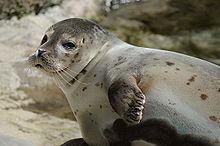True seals
| Earless seals Temporal range: 15–0 Ma Middle Miocene - Holocene |
|
|---|---|
 |
|
| Common seal, Phoca vitulina | |
| Scientific classification | |
| Kingdom: | Animalia |
| Phylum: | Chordata |
| Class: | Mammalia |
| Order: | Carnivora |
| Suborder: | Caniformia |
| Clade: | Pinnipedia |
| Superfamily: | Phocoidea |
| Family: |
Phocidae Gray, 1821 |
| Genera | |
The earless seals or true seals are one of the three main groups of mammals within the seal lineage, Pinnipedia. All true seals are members of the family Phocidae /ˈfoʊsᵻdiː/. They are sometimes called crawling seals to distinguish them from the fur seals and sea lions of the family Otariidae. Seals live in the oceans of both hemispheres and, with the exception of the more tropical monk seals, are mostly confined to polar, subpolar, and temperate climates. The Baikal seal is the only species of exclusively freshwater seal.
Adult phocids vary from 1.17 m (3.8 ft) in length and 45 kg (99 lb) in weight in the ringed seal to 4.9 m (16 ft) and 2,400 kg (5,300 lb) in the southern elephant seal.
Phocids are more specialized for aquatic life than otariids. They lack external ears and have sleek, streamlined bodies. Retractable nipples, internal testicles, and an internal penile sheath provide further streamlining. A smooth layer of blubber lies underneath the skin. Phocids are able to divert blood flow to this layer to help control their temperatures.
...
Wikipedia
